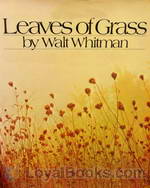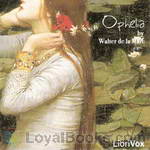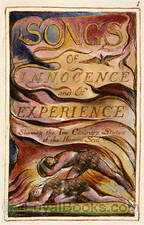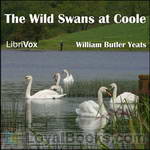|
Books Should Be Free Loyal Books Free Public Domain Audiobooks & eBook Downloads |
|
|
Books Should Be Free Loyal Books Free Public Domain Audiobooks & eBook Downloads |
|
Poetry |
|---|
|
Book type:
Sort by:
View by:
|
By: W. S. Gilbert (d 1911) | |
|---|---|
 More Bab Ballads
More Bab Ballads
This is a subset of the first twelve poems from the second collection of Gilbert’s “Bab Ballads” – light verses poking fun at the life and people of his time in Gilbert’s unique “topsy-turvey” style. The epitaph on his memorial on the Victoria Embankment in London is “HIS FOE WAS FOLLY AND HIS WEAPON WIT”, an epitaph amply exemplified in these verses. | |
By: Walt Mason (1862-1939) | |
|---|---|
 Rippling Rhymes
Rippling Rhymes
| |
By: Walt Whitman (1819-1892) | |
|---|---|
 Leaves of Grass
Leaves of Grass
Nearly 160 years after it was first published, Walt Whitman's Leaves of Grass continues to inspire, enthrall and educate generations of readers. This collection of poems serves as a vehicle for Whitman's philosophy, ideals, love of nature and mystical musings and it subsequently became one of the corner stones of American literature. Whitman was inspired to write Leaves of Grass based on Ralph Waldo Emerson's clarion call for a truly American poet who would tell of its glories, virtues and vices... | |
 Specimen Days
Specimen Days
Specimen Days is essentially the great American poet Walt Whitman’s scrap book. It documents most of his life’s adventures, espeically his experience serving as a nurse during the Civil War and travelling around America. | |
 Song of the Broad-Axe - stanza 4
Song of the Broad-Axe - stanza 4
This Weekly Poem is an excerpt from Song of the Broad-axe (4th Stanza) by Walt Whitman, who was an American poet, essayist and journalist. A humanist, he was a part of the transition between transcendentalism and realism, incorporating both views in his works. Whitman is among the most influential poets in the American canon, often called the father of free verse. | |
By: Walter Crane (1845-1915) | |
|---|---|
 A Floral Fantasy in an Old English Garden
A Floral Fantasy in an Old English Garden
| |
 Queen Summer or, The Tourney of the Lily and the Rose
Queen Summer or, The Tourney of the Lily and the Rose
| |
By: Walter de la Mare | |
|---|---|
 Ophelia
Ophelia
Ophelia, poem of the week for February 25, 2007; read here by twelve of our readers. Ophelia loved Hamlet, was repulsed by him, and went insane. She drowned in a stream, gathering flowers of remembrance. This is one of a number of poems that de la Mare wrote about Shakespeare characters. | |
By: Walter De la Mare (1873-1956) | |
|---|---|
 Songs of Childhood
Songs of Childhood
| |
 The Listeners and Other Poems
The Listeners and Other Poems
| |
 Peacock Pie: A Book of Rhymes
Peacock Pie: A Book of Rhymes
These wonderful, whimsical poems from the incomparable Walter de la Mare describe the bliss of childhood, explore the marvel of a child's imagination and portray the intriguing landscapes of existences both lived and imagined by a young mind in a magical kingdom located somewhere between daydream and caprice. In these poems we experience aspects of a reality unencumbered by concern, unhindered by anxiety, and share an imagination free to wander, ponder, contemplate, envision and express itself in a marvelous mosaic of impression, inspiration and introspection... | |
By: Walter Pater (1839-1894) | |
|---|---|
 Aesthetic Poetry
Aesthetic Poetry
| |
By: Walter Richard Cassels (1826-1907) | |
|---|---|
 Eidolon, or The Course of a Soul And Other Poems
Eidolon, or The Course of a Soul And Other Poems
| |
By: Walter Savage Landor (1775-1864) | |
|---|---|
 Poet Who Sleeps
Poet Who Sleeps
LibriVox readers bring you 13 versions of The Poet Who Sleeps by Walter Savage Landor. This was the weekly poetry project for December 1, 2013. | |
 Gebir
Gebir
| |
By: Wilfred S. Skeats | |
|---|---|
 The Song of the Exile—A Canadian Epic
The Song of the Exile—A Canadian Epic
| |
By: Wilhelm Busch (1832-1908) | |
|---|---|
 Max and Maurice a juvenile history in seven tricks
Max and Maurice a juvenile history in seven tricks
| |
By: William Platt | |
|---|---|
 Stories of the Scottish Border
Stories of the Scottish Border
Nothing seems to be known about Mr and Mrs William Platt, the writers of Stories of the Scottish Border. What they produced is an eccentric guidebook and history, seen partly through the ballads of the region. The book recounts the military stratagems, treachery and courage of those who struggled for control of the Border lands and of the whole country, and tells of the triumphs or tragic fate of those who took part on both sides. It also tells us stories of the Border Reivers, raiders who lived by riding out and stealing their neighbours’ livestock... | |
By: William Allingham (1824-1889) | |
|---|---|
 Twilight Voices
Twilight Voices
William Allingham was an Irish poet, diarist and editor, who wrote several volumes of lyric verse. | |
By: William Barksted (fl. 1611) | |
|---|---|
 Seven Minor Epics of the English Renaissance (1596-1624)
Seven Minor Epics of the English Renaissance (1596-1624)
| |
By: William Barnes (1801-1886) | |
|---|---|
 Poems of Rural Life in the Dorset Dialect
Poems of Rural Life in the Dorset Dialect
| |
By: William Benson (1682-1754) | |
|---|---|
 Letters Concerning Poetical Translations And Virgil's and Milton's Arts of Verse, &c.
Letters Concerning Poetical Translations And Virgil's and Milton's Arts of Verse, &c.
| |
By: William Blake (1757-1827) | |
|---|---|
 Songs of Innocence and Experience
Songs of Innocence and Experience
“Tiger, tiger, burning bright/In the forests of the night/ What immortal hand or eye/ Could frame thy fearful symmetry?” These often quoted lines are part of The Tiger in William Blake's Songs of Innocence and Experience. In 1789, William Blake released a limited edition of the book. Being a gifted artist, poet and printmaker, he undertook to personally publish all his work himself through a very painstaking but highly artistic process of etching, thereby transferring his drawings and poems individually onto copper plates by hand... | |
 Poems of William Blake
Poems of William Blake
Songs of Innocence and of Experience: Shewing the Two Contrary States of the Human Soul are two books of poetry by the English poet and painter, William Blake. Although Songs of Innocence was first published by itself in 1789, it is believed that Songs of Experience has always been published in conjunction with Innocence since its completion in 1794. Songs of Innocence mainly consists of poems describing the innocence and joy of the natural world, advocating free love and a closer relationship with God, and most famously including Blake’s poem The Lamb... | |
 Marriage of Heaven and Hell (version 2)
Marriage of Heaven and Hell (version 2)
"The road of excess leads to the palace of wisdom."The Marriage of Heaven & Hell is William Blake’s masterpiece – a piously blasphemous reimagining of the duality of good and evil as an eternal dance of equally essential polarities.Good, in Blake’s complex cosmology, is defined by a blind deference to the external, rational order embodied by the tyrant and the priest. Evil is the chaotic and revolutionary impulse that defies all reason and authority.While Blake’s sympathies are clearly with the Romantic revolutionary, he argues for the necessity of both sides, which create balance through their eternal opposition. | |
By: William Butler Yeats (1865-1939) | |
|---|---|
 The Wild Swans at Coole
The Wild Swans at Coole
The Wild Swans at Coole is a collection of poems by William Butler Yeats, first published in 1917. It is also the name of a poem in that collection. The Wild Swans at Coole is in the "middle stage" of Yeats' writing and is concerned with, amongst other themes, Irish nationalism and the creation of an Irish aesthetic. | |
 In The Seven Woods Being Poems Chiefly of the Irish Heroic Age
In The Seven Woods Being Poems Chiefly of the Irish Heroic Age
| |
By: William Collins (1721-1759) | |
|---|---|
 The Poetical Works of William Collins With a Memoir
The Poetical Works of William Collins With a Memoir
| |
By: William Cowper (1731-1800) | |
|---|---|
 The Task and Other Poems
The Task and Other Poems
| |
 The Diverting History of John Gilpin
The Diverting History of John Gilpin
| |